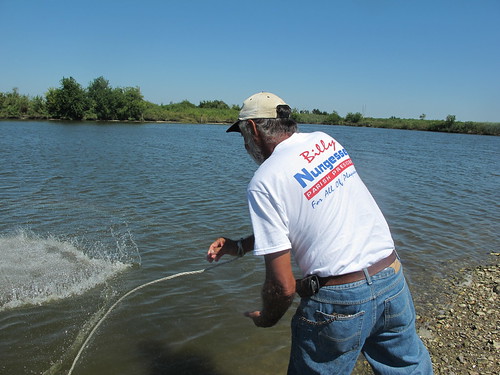by Rocky Kistner
Reposted from Huffington Post (click here)
Original article at NRDC (click here)
JJ Creppel stood in his baseball cap and white rubber boots and threw his small net into the muddy bayou. Pickups and cars zoomed nearby along Hwy 23, the only road connecting oil-wrecked lower Plaquemines Parish to the wealthier suburbs of New Orleans. Creppel hauled in the net and flung the small catch onto the boat launch. A few baby pogies flopped on the gravel, among them a few small shrimp.
"Not much here," Creppel said as he picked them up and flung them into a bucket. "The small ones I can give to the cat and the rest I'll use as bait to try to catch some bigger fish. A year ago before the spill I would get 15 to 20 shrimp per throw here, but now just 3 to 4 if I'm lucky."
On his next throw, he got none.
At 57, Creppel, a member of the United Houma Tribe, is a veteran fisherman of these waters. He was born here in a small medical clinic by water tower of Buras, the former residential center of this area. But five years ago, Katrina paid a visit and 25 feet of water poured over the levies and tore through the town streets, ripping down houses, punching holes the size of fire trucks through brick buildings and flinging refrigerators and cars into treetops. Buras struggled to recover. But when the BP oil disaster struck in April, this famous fishing community was delivered a near mortal blow.
It nearly killed Creppel. After watching the BP oil well spew millions of gallons of Louisiana crude a day into his Gulf fishing grounds, Creppel says became so stressed out he had a heart attack and landed in the hospital. By the time he got out he was saddled with medical bills and couldn't afford to get his boat fixed. That cut him off from the only real income he had. Now what fish he and his family eat comes from what he can catch along the banks. And it isn't much.

-
-
All photos by Rocky Kistner/NRDC
All photos by Rocky Kistner/NRDC
Creppel and his fiancà � live in a small 25 ft trailer on a large piece of property he rents for $100 a month. He laid a blue plastic tarp over the top of the trailer to plug the leaks. Cement blocks on top hold it in place. Halloween decorations already are up on the windows. He has 16 grandkids and now two of them are sleeping with them in the tiny trailer. They have a few goats, chickens and ducks that help provide milk and eggs and some meat, but the fishing they relied on for their steady diet and income is mostly gone.
Creppel says all of the $12,000 he's received from BP so far was spent on his family and his medical bills. His fiancà � no longer gets any BP money, even though she worked as a deck hand. He doesn't know how much he will get from BP, but he knows until he gets his boat going he won't be able to make ends meet. Even if he does get out on the water, the market for Gulf seafood has cratered. There's not much demand for fish tainted by the worst US offshore oil spill in history. You can't pay for boat fuel getting $2 a pound for large shrimp and 60 cents for the small. Creppel says he knows fishermen who've pulled up oil in shrimp and crabs. But he also knows some spots where the fishing is safe, areas that weren't impacted by oil. Right now he can't get to them without a boat, and no one is doing much to help.
Creppel never got cleanup work from BP and neither did many of his friends. He believes a lot of it has to do with politics, and he says BP didn't want to hire locals who would complain about the way it handled things. Many fishermen claim oil was dropped to the bottom by chemical dispersants when it could have been cleaned up on the surface, and they've seen workers sitting idly in boats when tar ball rolled into the marshes.
(Note: You can view every article as one long page if you sign up as an Advocate Member, or higher).





